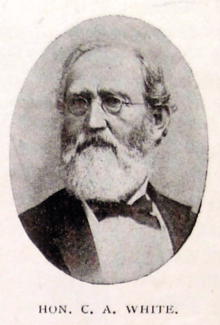Chilton A. White
Chilton Allen White (February 6, 1826 – December 7, 1900) was an American politician. He was a Democrat and a U.S. Representative from Ohio.
Chilton Allen White | |
|---|---|
 | |
| Member of the U.S. House of Representatives from Ohio's 6th district | |
| In office March 4, 1861 – March 3, 1865 | |
| Preceded by | William Howard |
| Succeeded by | Reader W. Clarke |
| Member of the Ohio Senate from the 4th district | |
| In office January 2, 1860 – March 3, 1861 | |
| Preceded by | William R. Kinkead |
| Succeeded by | John Johnson |
| Personal details | |
| Born | February 6, 1826 Georgetown, Ohio, U.S. |
| Died | December 7, 1900 (aged 74) Georgetown, Ohio |
| Resting place | Confidence Cemetery |
| Political party | Democratic |
| Military service | |
| Allegiance | United States |
| Branch/service | United States Army |
| Unit | 1st Reg. Ohio Volunteers |
| Battles/wars | Mexican–American War |
Early life and education
Born in Georgetown, Ohio, White attended the public schools and the subscription school run by his father, John D. White, where he befriended Ulysses Grant, a classmate. He taught school. He served in the Mexican–American War with Company G, First Regiment, Ohio Volunteers. He studied law.
Career
He was admitted to the bar in 1848 and commenced the practice of law in Georgetown, Ohio. He served as prosecuting attorney of Brown County from 1852 to 1854. He served as member of the Ohio Senate in 1859 and 1860.
White was elected as a Democrat to the Thirty-seventh and Thirty-eighth Congresses (March 4, 1861 – March 3, 1865). His vote on the Thirteenth Amendment is recorded as nay. He was an unsuccessful candidate for reelection in 1864 to the Thirty-ninth Congress.
During the American Civil War, he opposed the use of black soldiers by the U.S. Army, reportedly saying that "This is a Government of white men, made by white men for white men, to be administered, protected, defended, and maintained by white men."[1]
He resumed the practice of law in Georgetown. He served as delegate to the State constitutional convention in 1873. He was an unsuccessful candidate for secretary of state in 1896.
Later life and death
He died in Georgetown, Ohio, December 7, 1900. He was interred in Confidence Cemetery.
References
- Forrest G. Wood, Black Scare: The Racist Response to Emancipation and Reconstruction (1968), p. 43; citing CG, 37 Cong., 3 Sess. (Feb. 2-5, 1863), pp. 680-690, and Appendix (Feb. 2, 1863), p. 93; White, "Speech".
External links
| Wikiquote has quotations related to: Chilton A. White |
- United States Congress. "Chilton A. White (id: W000360)". Biographical Directory of the United States Congress.
- Chilton A. White at Find a Grave

